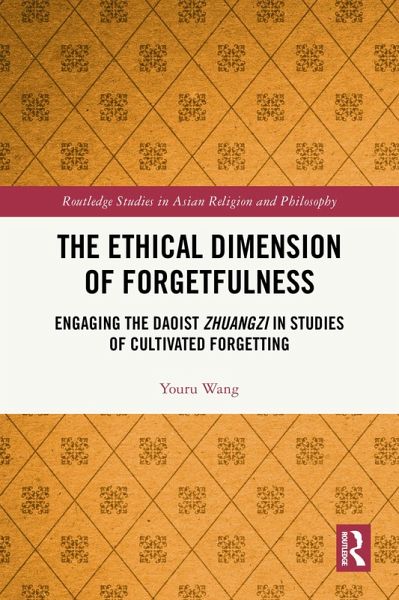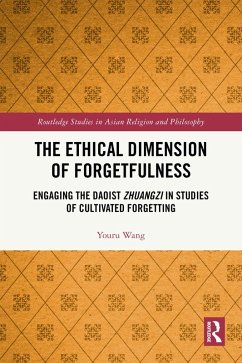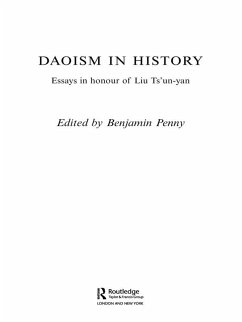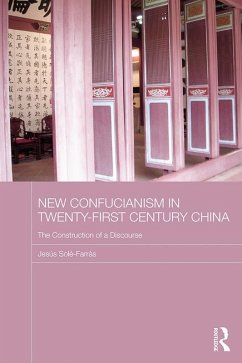
The Ethical Dimension of Forgetfulness (eBook, PDF)
Engaging the Daoist Zhuangzi in Studies of Cultivated Forgetting
Versandkostenfrei!
Sofort per Download lieferbar
42,95 €
inkl. MwSt.
Weitere Ausgaben:

PAYBACK Punkte
21 °P sammeln!
This book investigates the various meanings of forgetting and their ethical dimension in the Daoist classic Zhuangzi.It responds to recent scholarship in the study of the ethics of forgetting, which has only emerged within the past two decades in the wake of the widespread memory-studies of the late 20th century. This book accomplishes two goals: First, it assimilates insights from contemporary scholarship, and specifically applies Ricoeur's three areas of ethical examinations of forgetting, to the study of the Zhuangzi. It addresses a wide range of ethical themes related to acts of forgetting...
This book investigates the various meanings of forgetting and their ethical dimension in the Daoist classic Zhuangzi.
It responds to recent scholarship in the study of the ethics of forgetting, which has only emerged within the past two decades in the wake of the widespread memory-studies of the late 20th century. This book accomplishes two goals: First, it assimilates insights from contemporary scholarship, and specifically applies Ricoeur's three areas of ethical examinations of forgetting, to the study of the Zhuangzi. It addresses a wide range of ethical themes related to acts of forgetting, such as the meaning of well-being and healing, the issue of personal identity and relational autonomy, the norm of spontaneity, naturalness and suitability, the capacities for being empathic, altruistic and responsive to others, and the values of accommodation, receptivity and all-inclusive friendliness. Second, it places forgetfulness in the wider context of the Zhuangzi's ethical inquiry, and offers a novel understanding of this age-old notion and its exegetic tradition, bringing them into dialogue with Western philosophy and contributing to contemporary discourse on the ethics of forgetting.
As the first book to present a comprehensive examination on the ethical dimension and meanings of forgetting or forgetfulness in the Daoist philosophy of the Zhuangzi, this monograph will be of interest to researchers in Asian philosophy, religion and culture, moral philosophy or ethics, the study of memory and forgetting, and comparative or cross-cultural philosophy and ethics.
It responds to recent scholarship in the study of the ethics of forgetting, which has only emerged within the past two decades in the wake of the widespread memory-studies of the late 20th century. This book accomplishes two goals: First, it assimilates insights from contemporary scholarship, and specifically applies Ricoeur's three areas of ethical examinations of forgetting, to the study of the Zhuangzi. It addresses a wide range of ethical themes related to acts of forgetting, such as the meaning of well-being and healing, the issue of personal identity and relational autonomy, the norm of spontaneity, naturalness and suitability, the capacities for being empathic, altruistic and responsive to others, and the values of accommodation, receptivity and all-inclusive friendliness. Second, it places forgetfulness in the wider context of the Zhuangzi's ethical inquiry, and offers a novel understanding of this age-old notion and its exegetic tradition, bringing them into dialogue with Western philosophy and contributing to contemporary discourse on the ethics of forgetting.
As the first book to present a comprehensive examination on the ethical dimension and meanings of forgetting or forgetfulness in the Daoist philosophy of the Zhuangzi, this monograph will be of interest to researchers in Asian philosophy, religion and culture, moral philosophy or ethics, the study of memory and forgetting, and comparative or cross-cultural philosophy and ethics.
Dieser Download kann aus rechtlichen Gründen nur mit Rechnungsadresse in A, B, BG, CY, CZ, D, DK, EW, E, FIN, F, GR, HR, H, IRL, I, LT, L, LR, M, NL, PL, P, R, S, SLO, SK ausgeliefert werden.













